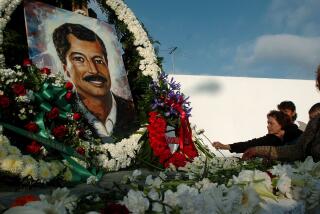Fox to Review Case of Jailed Environmentalists
MEXICO CITY — In a gesture welcomed by human rights activists, Mexican President Vicente Fox met Tuesday with supporters of two environmental activists imprisoned here and asked his lawyers to review their case for possible injustices, government officials said.
But citing limits on his executive powers, Fox declined to intervene directly in the case of Rodolfo Montiel, a peasant farmer who forged a grass-roots campaign against deforestation in southwestern Mexico, and Teodoro Cabrera, Montiel’s colleague, also active in the peasant movement.
Montiel and Cabrera are serving prison terms after being convicted last year on controversial drug and weapons charges. Their case has produced an international outcry; advocates for the two men claim that they were tortured and framed for their political activities opposing logging in Guerrero state.
Also Tuesday, Montiel and Cabrera were awarded in absentia the Sierra Club’s Chico Mendes prize for environmental heroism. Human rights activist Ethel Kennedy, widow of Robert F. Kennedy, presented a plaque to Montiel’s wife, Ubalda Cortes Salgado, at a gathering in Mexico City. Kennedy is scheduled to visit the two men in prison today.
A representative of Fox’s government attended the event, reaffirming Fox’s interest in a solution to the case, which he said remains within the purview of the judiciary.
“For us, it is very significant that they don’t remain jailed if it is because they were defending the environment,” said Rodolfo Lacy Tamayo, a liaison from Fox’s Environment Ministry, speaking before reporters, peasant activists and human rights workers. “We would like to see the reverse situation exist--that people defend our forests, our water, our environment. We don’t want to persecute people for doing that.”
Activists praised the government’s response. “This was the first sign of interest on the government’s part and a difference from what we saw in the previous administration--which was no opening whatsoever,” said Edgar Cortez, director of the Miguel Agustin Pro Human Rights Center in Mexico City. The organization has handled the activists’ defense.
Alejandro Queral, a Sierra Club human rights worker, said Lacy’s presence was a powerful gesture. The case, he said, is a human rights litmus test for the new president.
Early in 1998, Montiel, who has a first-grade education, organized peasants from the western slopes of the impoverished Sierra Madre region in Guerrero to fight commercial logging. Local farmers believed that logging was eroding their cropland and turning it into desert. They staged protests, blocked logging trucks and ran afoul of local political bosses in a region troubled by a guerrilla movement and drug trafficking.
After the two were arrested in May, prosecutors accused Montiel and Cabrera of ignoring orders to halt and firing on soldiers. They said Montiel was armed with a pistol and accused him of growing marijuana.
The activists’ lawyers say they are innocent, and accuse authorities of torturing Montiel to extract a confession. The National Human Rights Commission issued a report in July saying civil rights violations occurred. Montiel and Cabrera were convicted in August nonetheless, and their appeals have been unsuccessful.
Montiel is serving a sentence of six years and eight months, and Cabrera a sentence of 10 years. Attorneys are pursuing the possibility of having the sentences thrown out due to irregularities in the judicial process, an effort that could take months, Cortez said. The Mexican Green Party has introduced a measure in Congress seeking amnesty for them, he said.
More to Read
Sign up for Essential California
The most important California stories and recommendations in your inbox every morning.
You may occasionally receive promotional content from the Los Angeles Times.










